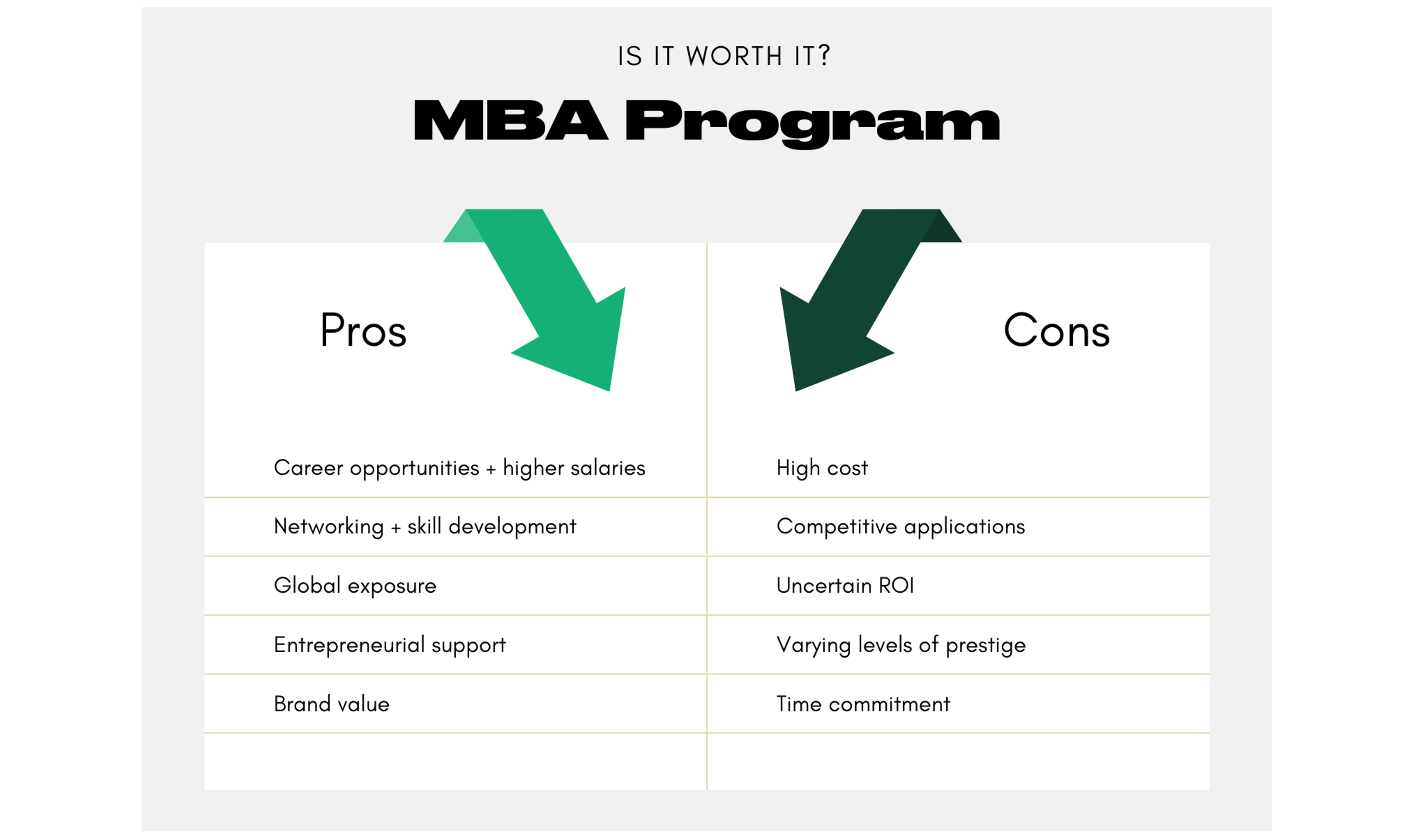
Table of Contents
Free Event

Featuring Melanie E.
How to Get a Head Start on Your MBA Application
Starting Wednesday, April 16
10:00 PM UTC · 60 minutes

Featuring Melanie E.
What is an MBA Program?
A Master's of Business Administration, otherwise known as an MBA, is a two-A Master's of Business Administration, otherwise known as an MBA, is a two-year graduate business administration degree. Students learn about a wide range of management skills, including business administration and finance, and usually have the opportunity to specialize. It covers a wide range of subjects from accounting, applied statistics, business communication, entrepreneurship, business ethics, and other relevant subjects.
In this article, we'll cover everything you need to know to make an informed decision on whether an MBA is worth it for your background and goals.
Read: What is an MBA Degree?
Why Get an MBA?
Professionals gravitate towards an MBA when they want to further their education or improve their career, compensation, and job opportunities. Aspiring entrepreneurs will also learn the necessary leadership skills and mechanics of how to start a business.
During the first year of an MBA degree, students will focus on more general coursework as part of the program's core curriculum. This usually includes finance, accounting, marketing, communication, and other related subjects. The second year is usually spent on a more focused curriculum, through electives, internships, or global opportunities.
For more info on curriculum and elective structures, read: Not Every MBA Program is Made Equal–An Overview of the Program Structures of Top Business Schools
The exact benefits of a business degree will differ depending on the individual's background, goals, and aspirations. Business school is not right for everyone. Some of the other common motivations for pursuing this graduate degree include:
- Expanding personal networks
- Preparing for a career transition
- Undecided on a career path within the business world and looking to explore
- Get more career advancement opportunities (promotions, salary increases, etc.)
- Plan to start a business
Read: When to Get an MBA, When Not To – and How it Affects Your Chances of Getting In
Full-Time, Part-Time, Online, and Executive MBA Programs
In order to make the most informed decision on whether a business school is right for you, it's important to look at the different kinds of programs as they have different benefits and drawbacks.
Full-Time MBA
The full-time, two-year program is the most expensive and immersive. It is best for students who can fully focus on studying for the two years needed to complete the degree and relocate to the business school. It requires the most adjustments and expenses, but also offers the most benefits; there is more time for networking, internships, a full course load, extracurriculars, etc.
Part-Time MBA
A part-time program is a good option for people who'd like to retain full-time employment while they complete their degree. It's more flexible and usually cheaper, but there is less time for the aforementioned benefits: networking, internships, and classes.
This is generally a good option for people who are already in their desired career path and would use the MBA to provide salary and role opportunities that require an advanced degree.
Online MBA
Similar to a part-time MBA in terms of its pros and cons, an online MBA can be beneficial for those looking to obtain the degree without sacrificing geographic location and employment, and who would benefit less from the networking and robust curriculum.
Executive MBA
An executive MBA program caters to professionals later in their careers. They're typically a bit shorter than full-time MBA programs and cater to the more advanced knowledge of the participants.
Deferred MBA
The newest type of MBA program, these are open to undergraduate students or graduate degree students without full-time work experience. Generally, students will apply in their senior year of college.
If admitted, they then defer for 2-5 years while they obtain full-time work experience, their spot in the class saved.
When weighing the different pros and cons of business school, keep in mind the type of program that you're interested in. For example, with a full-time MBA program, you'll have to carefully consider the high tuition and time commitment as major factors. For part-time MBA programs and online MBA programs, time and finances are still a consideration, but less so.
For more information on the different types of degrees, see The Different Types of MBA Programs—and Which One is Right for You.
Admission Requirements
Let's briefly review the admission requirements of an MBA program. The most common requirements for for the MBA application at the majority of business schools include:
- Bachelor's Degree
- Undergraduate Transcripts
- MBA Resume
- Letters of Recommendation
- Standardized Test Score (GMAT/GRE/EA)
- Essays
- Application Fee
- Interview
Applications are submitted in different rounds so students can choose the best round for their schedule. Generally, Round 1 is recommended as there are more spots available so chances for admission are slightly higher. International applicants may be required to take the IELTS or TOEFL depending on the program they're applying to and where they received their bachelor's.
Make sure to check the specific university for their requirements as there are some discrepancies.
Paying for Your MBA
MBAs can be a very costly venture–from tens of thousands for cheaper, online programs to $150,000+ for tuition and expenses at top programs. However, there are different financing options available that will affect the decision of whether an MBA is worth it.
The most common financing options for this degree include merit-based and need-based scholarships (internal and external), federal and private loans, and company sponsorship. The specific opportunities available to applicants will depend on their personal finances, grades, employment, and a myriad of other factors.
An important note to add is that whether the cost is worth it also depends heavily on your career path and chosen industry. People coming from or going into fields like finance (private equity, venture capital, hedge funds, etc.), consulting, tech, etc. will have an easier time paying back loans as their post-MBA salary will likely be high and they will recuperate the tuition quickly.
Those going into non-profits, government work, or even startups may want to carefully consider the decision as the post-MBA salary for these industries is quite a bit lower.
Read:
- Financial Aid Options for Pursuing an MBA Program
- 4 Expert Tips on Paying for Business School
- MBA Scholarships for the Top 10 Business Schools
- Top 5 MBA Scholarships for Women
The Different Tiers of Business Schools
Not all MBA programs are created equal, and another important factor in deciding whether an MBA is worth it is knowing the tier of business school that you're aiming for, and the one you're likely to get into.
Tier 1: The M7 Programs
The best business schools in the world are often referred to as the "M7." These include Harvard Business School, Stanford GSB, University of Pennsylvania Wharton, Chicago Booth, Northwestern Kellogg, MIT Sloan, and Columbia Business School.
The acceptance rates for these programs typically lie between 8% to 33%, depending on the year and school. The average GPA and standardized test scores are competitive; for example, at Harvard Business School, the median GMAT score is 740, the median GRE score is 163 (Quant and Verbal), and the average GPA is 3.73.
Tier 2: The Top 25 Programs
The top 25 business schools include many great, competitive programs that offer a lot of the same benefits as the M7 without the selective acceptance rates. Though not quite as prestigious, they still provide tons of networking opportunities, work experience, internships, a robust curriculum, and a degree that will likely allow MBA graduates to find better jobs and higher salaries.
These schools' acceptance rates are typically between 20% to over 50%; still competitive, but slightly less so. For example, Duke Fuqua's class profile indicates:
- Middle 80% GPA: 3.1–3.89
- Middle 80% GMAT scores: 670–760
- Middle 80% GRE scores: 306–330 (combined)
See: The Top 25 Business Schools' Acceptance Rates & Class Profiles and The Top 25 MBA Programs—and How to Get In
Tier 3: Other Accredited MBA Programs
These schools, while not among the top-ranked, still offer MBA programs that provide some advantages. They are usually more affordable and have stronger regional networks. They also offer more online MBA programs and other flexible offerings. These programs typically have higher acceptance rates, with some schools admitting over 95% of applicants.
The Pros and Cons of Pursuing an MBA
Let's now go deeper into the pros and cons of this business degree. This list is comprehensive, but not exhaustive. Depending on your personal circumstances, some of these may not be applicable and they will have different weights.
For example, if your company sponsors your MBA, price will not be a factor at all, but others still might be–two years is still a long time to dedicate to a degree. Take this list as inspiration and make your own, taking into account the importance and relevancy of each factor to your situation.
Pros
- Career opportunities - An MBA can open doors to more executive positions across a variety of industries
- Higher salaries - Graduates from top MBA programs often see a significant increase in their earning potential
- Networking - Top business schools offer unparalleled networking opportunities with classmates, professionals, alumni, and industry leaders worldwide
- Skill development - MBA courses are designed to develop strong leadership and management skills applicable across various business contexts
- Global exposure - Many programs include global immersion trips, international case studies, and opportunities to study abroad
- Entrepreneurial support - Many top schools provide access to business incubators, venture competitions, and seed funding opportunities for budding entrepreneurs as well as mentorship with successful entrepreneurs and faculty members
- Brand value - Graduating from a top-tier school adds a prestigious credential to your resume, enhancing your marketability
Cons
- High cost - The cost of attending a top MBA program can be prohibitively high, including tuition, books, and living expenses. There is also an opportunity cost associated with the time spent in the program that could have been used to gain other work experience
- Competitive application process - Top programs have rigorous admission criteria, including high GMAT scores, exceptional work experience, long essays, and academic records
- Uncertain return on investment (ROI) - Despite the high cost, there's no guarantee of a job placement or the desired salary increase, especially in volatile economic conditions.
- Rapidly changing business landscape - The fast pace of change in technology and business models may outpace the curriculum, potentially leading to gaps in relevant skills
- Varying levels of prestige - MBAs from schools outside of the M7 or top 25 are not as competitive and will likely not provide as many opportunities as a top school
- Time commitment - Any advanced degree takes a lot of time and work. Those two years will require some level of dedication and sacrifice.
- Business focus - As an MBA is a business degree, it is most beneficial to those who want to work in a business or management-related field; applicants interested in other fields may not get as many advantages from an MBA
Read: How to Choose an MBA Program–The Discerning Student’s Guide and The Truth About Business School Rankings–and What it Means for You

Post-MBA Employment & Salary Statistics
The primary motivation for most people considering business school is the career development and salary opportunities that a Master's in Business Administration affords. The specific way in which an MBA will affect your career path depends heavily on the industry, role, and level of the individual, as well as the macroeconomic environment and tier of business school.
To gauge how effective an MBA will be in positively impacting your career goals, here is what you should do:
- Identify your target programs – Create a balanced list of MBA programs, including a few "safe" schools (where your profile exceeds the average accepted candidate), "target" schools (where your profile closely matches), and "reach" schools (where admission is more competitive).
- Research MBA employment reports – For each program on your list, download and review the most recent "MBA Employment Report." These documents are packed with valuable insights.
- Analyze industry and role trends – Use the reports to identify which industries and roles graduates from each program typically enter. This will help you evaluate whether the program aligns with your career aspirations.
- Evaluate salary and bonus data – Review starting salary and bonus figures to gauge the financial outcomes for graduates. Look for programs that deliver strong ROI based on your career goals.
- Check recruiting companies – Note the companies that frequently recruit from each program. If there are specific organizations you aspire to work for, prioritize schools with strong relationships with those employers.
- Tailor your applications – Leverage the insights you gain to craft targeted applications that highlight how the program’s offerings align with your career goals.
For example, here are the employment statistics for several top programs: Stanford GSB (typically ranked #1) and University of Berkeley Haas (typically ranked #10-12).
Stanford GSB Employment Report Snapshot
- Received Job Offer: 89%
- Accepted Job Offer: 82%
- Median Base Salary: $182,500
- Finance Median Base Salary: $200,000
- Tech Median Base Salary: $177,500
- Consulting Median Base Salary: $192,000
- Received Job Offer: 93%
- Accepted Job Offer: 85%
- Median Base Salary: $182,272
- Median Performance Bonus: $50,000
- Median Signing Bonus: $30,000
- Top 5 Industries:
- Finance: 33%
- Technology: 29%
- Consulting: 18%
- Health Care: 5%
- Media & Entertainment: 4%
See the full employment for more information here.

UC Berkeley Haas Employment Report Snapshot
- Received Job Offer: 89.5%
- Accepted Job Offer: 88.4%
- Median Base Salary: $166,650
- Top 5 Industries:
- Technology: 28.9%
- Consulting: 27.2%
- Finance: 14.5%
- Health Care: 7.5%
- Energy: 6.6%
See the full employment for more information here.

So, Is an MBA Worth it?
As this article has shown, the question of whether an MBA is worth it is complicated and depends on many factors, primarily including the school you want to go to and your personal circumstances.
In a survey from 2021, the Graduate Management Admissions Council (GMAC) forecasted that MBA graduates would earn an average salary of $115,000 while those without MBAs would earn an average of $65,000-75,000. That same survey asked alumni of MBA programs their perspective on their degree.
Out of almost 5,000 respondents, 9/10 reported a positive ROI from their Master's of Business Administration. 70% reported their graduate business education as Excellent or Outstanding, and 87% agreed that their MBA improved their employability.
When deciding whether an MBA is right for you, we recommend asking yourself the following questions:
- What are my long-term goals? How does an MBA align with them? Am I targeting an industry in which an MBA is valued or necessary?
- What skills and knowledge am I hoping to gain? Will the MBA curriculum fill gaps in my expertise or enhance my abilities in areas like strategic thinking, leadership, and financial acumen?
- Can I afford the cost of business school? What is my expected ROI? What financial resources are available to me?
- What type of MBA program suits my needs? What are those program's specific benefits and drawbacks?
- How important is the tier of business school to my goals? What schools can I realistically get into?
- Am I prepared for the intensity and demands of graduate school? Can I afford to dedicate those two years to school?
- Where do I want to live and work post-MBA?
- What are the employment rates and typical career paths of the graduates of my target programs?
An MBA program is likely worth it if you're seeking to advance your career to An MBA program is likely worth it if you're seeking to advance your career to managerial or executive levels, pivot to a new industry or function, expand your professional network, or launch your own business, and you've calculated that the potential return on investment—both in terms of salary increase and career opportunities—outweighs the costs.
An MBA program is probably not worth it if your career goals do not align with what the degree offers or you can reach your professional objectives through alternative means that do not require the significant financial and time investment of an MBA.
Before diving into the MBA application process, it’s important for anyone interested to know their “why.” Graduate studies are a grueling process but if students are able to follow a clear goal and remember their purpose, it will be easier to succeed.
Find Out if an MBA is Right for You
If you are planning on getting your MBA, the first step is researching schools, talking to current and past MBA candidates, and seeking advice from top MBA coaches.
Here at Leland, we’ve got lots of resources to help you succeed at every point in the process.
These articles will help get you started:
- A Comprehensive MBA Timeline–With Chart
- What is MBA Application Strategy?
- Why Should You Get an MBA? An Expert Coach's Perspective
FAQs
What is a typical MBA career path?
- A typical MBA career path often involves progression into leadership and managerial roles across various industries, including finance, consulting, technology, healthcare, and entrepreneurship. MBA graduates may start as managers, consultants, or analysts, advancing to executive positions such as CEO, CFO, or business owner.
Does MBA GPA matter?
- Not really, though it does depend on the school you go to and the industry you're hoping to get into.
Will an MBA help with landing a job?
- Yes, an MBA can help with landing a job by equipping candidates with valuable skills, expanding their professional network, and enhancing their resume. Graduates from reputable programs often benefit from campus recruitment and alumni networks, leading to higher employment rates.
Can you be successful without an MBA?
- Absolutely, many individuals achieve professional success without an MBA through experience, skill development, networking, and entrepreneurship. Success depends on personal drive, industry knowledge, and the ability to capitalize on opportunities.
Are online MBAs respected?
- It depends on the specific online MBA program, your industry and career path, and the tier of company you're hoping to get a job at. For prestigious and top firms/companies, online MBA programs are not as well regarded. For mid-tier or smaller/regional companies and firms, they can be, especially those offered by accredited and renowned institutions.
Does an MBA open doors?
- Yes, many. An MBA opens doors to higher-level employment opportunities, greater earning potential, and expansive professional networks. It provides a competitive edge in the job market, often leading to leadership and executive roles across various sectors.
What can I do instead of an MBA?
- Instead of an MBA, individuals can pursue professional certifications (e.g., PMP, CFA), specialized master's degrees (e.g., Master of Finance, Master of Science in Data Analytics), networking events, workshops, and online courses to gain skills and advance their careers.
Is an MBA actually useful?
- Yes, an MBA is actually useful for those looking to advance their career, transition into a new industry, or enhance their leadership and business management skills. It offers valuable networking opportunities, a broadened perspective on global business practices, and often a significant ROI through higher salary potential and career advancement. However, it will not be useful for everyone. It's important to consider your personal circumstances and goals to make this decision for yourself.
What are the disadvantages of an MBA?
- The disadvantages of an MBA include the high cost of tuition, potential student debt, the opportunity cost of time away from the workforce, and no guarantee of job placement. The benefits can also vary depending on the prestige of the program and the industry in which one seeks employment.
How much will an MBA increase my salary?
- An MBA can significantly increase your salary, with post-graduation increases often ranging from 50% to 100% of pre-MBA earnings. The exact amount can vary widely based on industry, geographic location, and the prestige of the MBA program. On average, most MBA graduates from top-tier programs tend to see the highest salary boosts.
Is an MBA worth it after 30?
- Yes, an MBA can be worth it after 30, offering opportunities for career advancement, higher earning potential, and personal growth. Many professionals pursue an MBA at this age to pivot their career paths, enhance their leadership skills, or accelerate their progression to senior roles. The decision should be based on individual career goals, financial situation, and the potential ROI of the program. Executive MBA programs may also be a good option for someone with more years in the workforce.


















